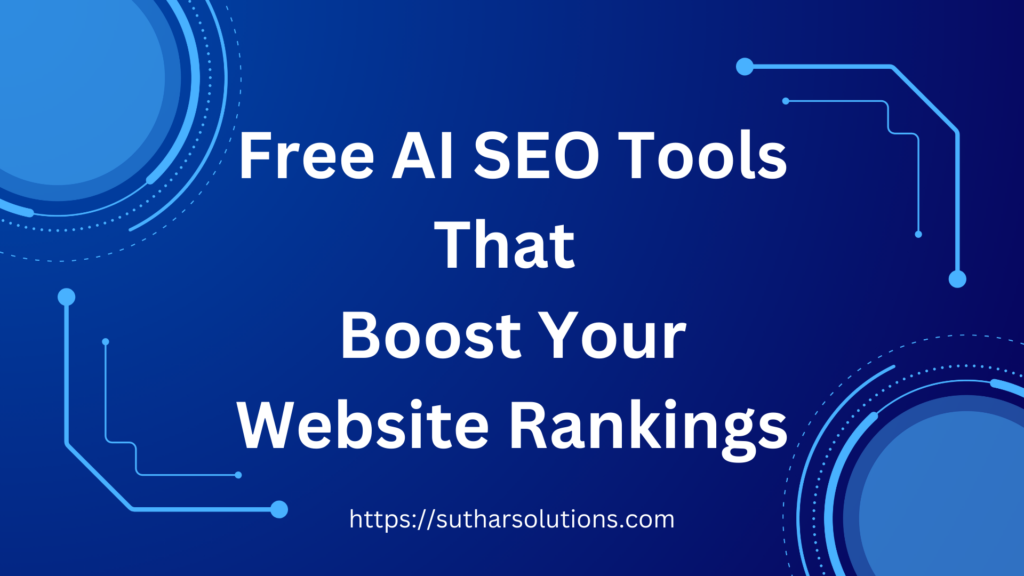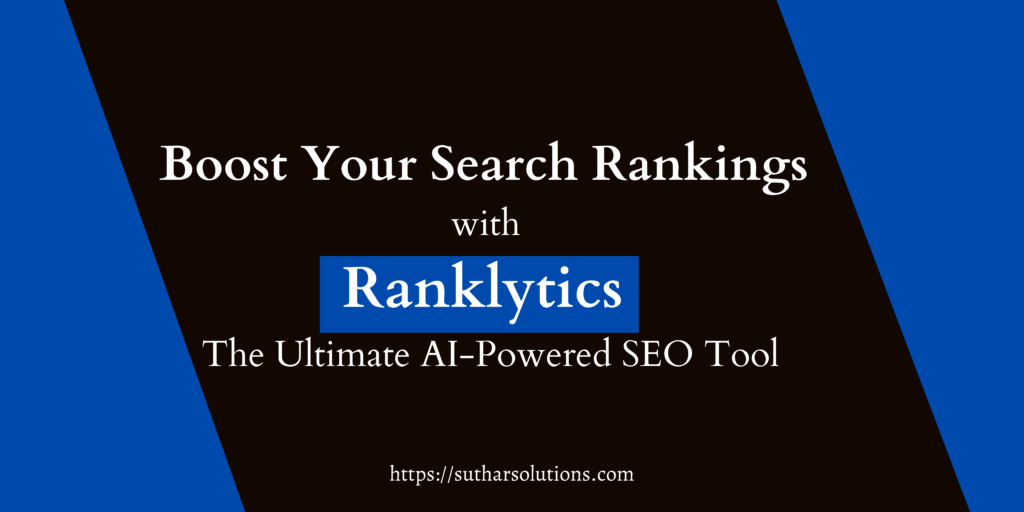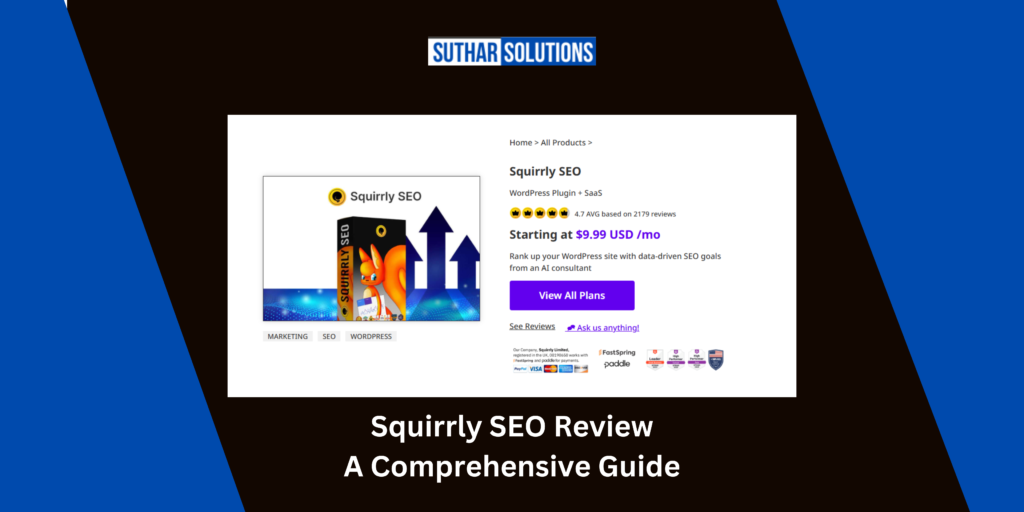The digital marketing landscape is constantly evolving, and one of the most revolutionary changes in recent years has been the integration of Artificial Intelligence (AI) into search engine optimization (SEO). AI is transforming how businesses and marketers approach SEO, making it more efficient, data-driven, and personalized. If you’re just diving into the world of AI-powered SEO, you’re in the right place. This guide will explore how to harness AI for SEO, focusing on the vital role of AI SEO keywords.
Table of Contents
Note:- Some of the products and services featured here, along with their links, are affiliate links. This means that if you make a purchase through them, I may earn a commission—at no extra cost to you. Read more….
What Is AI SEO?
AI SEO refers to using artificial intelligence technologies and tools to enhance the SEO process. AI tools are capable of analyzing vast amounts of data, identifying patterns, and making recommendations that help websites improve their search rankings. With AI, the once manual, time-consuming tasks of SEO—such as keyword research, content optimization, and link building—can now be automated and completed in a fraction of the time.
Key benefits of AI SEO include:
- Faster and more accurate keyword research
- Enhanced content optimization
- Better understanding of search intent
- Personalized SEO strategies
- Insights into competitors’ performance
In short, AI makes SEO smarter, faster, and more precise.
The Role of AI in Keyword Research
Keywords are the foundation of any successful SEO strategy. These are the words and phrases that people type into search engines when they’re looking for information. But not all keywords are created equal. You need to find the right balance between relevance, search volume, and competition. This is where AI comes in.
AI-powered tools such as Semrush, Ahrefs, and Google Keyword Planner use machine learning algorithms to analyze keyword data more efficiently. These tools can identify keyword trends, long-tail keyword opportunities, and provide insights into what your audience is searching for.
Here’s how AI can elevate your keyword research:
- Discover New Keywords
AI tools can help you find related keywords that you might not have considered. They can analyze large datasets to suggest new, relevant keywords that are trending in your niche. For example, if you’re targeting “AI in SEO,” an AI tool might suggest related keywords like “AI-powered SEO tools” or “AI for keyword research.” - Analyze Search Intent
AI excels at understanding search intent. It helps you figure out what users really want when they search for a keyword. By analyzing user behavior and patterns, AI tools can categorize keywords by intent—whether users are looking for information (informational), to make a purchase (transactional), or simply navigating to a specific site (navigational). - Evaluate Keyword Difficulty
Not all keywords are worth chasing. Some are so competitive that trying to rank for them would be a waste of resources. AI tools can evaluate keyword difficulty by analyzing the current top-ranking sites for those keywords, giving you insights into which keywords are worth targeting based on your website’s authority. - Personalized Keyword Suggestions
AI tools can analyze your website’s performance and suggest personalized keywords that are more likely to rank for your specific niche. These personalized insights can save you hours of manual research.
How AI Optimizes Content for SEO
Content is king, but AI is the ace that helps your content rule the search engine results pages (SERPs). AI tools can help you optimize your content to align with current SEO best practices.
Here’s how:
- Content Generation
Tools like ChatGPT, Jasper, and ContentShake can generate content based on the keywords you’re targeting. While AI-generated content often requires human editing for tone and accuracy, it can significantly speed up the writing process. - Content Optimization
AI-powered tools such as SurferSEO and Clearscope analyze top-performing content and provide suggestions on how to improve your content for SEO. This includes keyword placement, content structure, and readability improvements. - Schema Markup Generation
Schema markup helps search engines understand your content better and can result in rich snippets (like star ratings and reviews) in search results. AI tools like Jasper’s FAQ Schema Generator can create structured data for your site automatically, making it easier for search engines to crawl and index your content. - Real-Time SEO Recommendations
Tools like Semrush’s SEO Writing Assistant evaluate your content in real-time and give you recommendations to improve it based on factors like SEO, readability, originality, and tone of voice.
AI SEO Best Practices for Keywords
Now that we’ve established how AI enhances keyword research and content optimization, let’s dive into best practices to ensure you’re getting the most out of AI SEO tools.
- Focus on Search Intent
Before targeting any keyword, make sure you understand the search intent behind it. Is the user looking for information, making a purchase decision, or trying to navigate to a specific site? AI tools like Moz and Semrush help you categorize keywords by intent, ensuring that you target the right audience with the right content. - Target Long-Tail Keywords
Long-tail keywords—phrases containing three or more words—are typically less competitive but highly specific. These keywords often have lower search volumes but a higher chance of conversion because they target users further down the sales funnel. AI tools can help you discover these high-converting long-tail keywords. - Prioritize Keyword Difficulty
Don’t waste time chasing highly competitive keywords. Use AI tools to evaluate the keyword difficulty and focus on keywords that you have a realistic chance of ranking for. A good rule of thumb is to target keywords with a difficulty score lower than 50%, especially if your website is relatively new or has low authority. - Optimize for Voice Search
Voice search is becoming increasingly popular, especially with the rise of AI-powered devices like Amazon’s Alexa and Google Home. To optimize for voice search, consider targeting natural-sounding, conversational keywords. AI tools can analyze voice search trends and help you find keywords that people are likely to speak rather than type.
Future of AI in SEO
AI is not just a trend—it’s the future of SEO. As search engines like Google continue to evolve, they’re increasingly relying on AI to deliver more accurate, personalized results. This means that businesses that integrate AI into their SEO strategies will have a significant advantage.
In the future, we can expect:
- AI-Powered Algorithms
Search engines will continue to refine their algorithms using AI and machine learning. This means that ranking factors will become even more sophisticated, with a focus on user experience, content quality, and search intent. - Hyper-Personalization
AI will allow for more personalized search results. This means that keywords and content strategies will need to be highly tailored to specific audiences. AI tools will play a crucial role in understanding user preferences and delivering personalized content recommendations. - Increased Automation
As AI technology advances, more SEO tasks will become automated, including keyword research, content generation, and performance analysis. While human oversight will always be necessary to ensure quality and relevance, AI will handle much of the heavy lifting.
Conclusion
AI is changing the way we approach SEO, making it more efficient, data-driven, and personalized. By leveraging AI SEO tools, you can gain a competitive edge in keyword research, content optimization, and overall SEO strategy. As AI technology continues to evolve, it’s essential to stay updated on the latest trends and best practices to ensure your SEO efforts are always ahead of the curve.
Remember, while AI can automate much of the SEO process, human creativity and oversight are still necessary to produce high-quality, engaging content that resonates with your audience. So, use AI as a tool, not a replacement, and watch your SEO performance soar.
FAQs
Q1. What are AI SEO keywords?
AI SEO keywords are keywords identified and optimized using AI tools and technologies. These tools analyze vast amounts of data to help marketers find the most relevant and effective keywords for their SEO strategies.
Q2. How does AI help with keyword research?
AI-powered keyword research tools analyze search volumes, competition, and user behavior to suggest relevant keywords. AI can also categorize keywords by search intent and provide personalized keyword suggestions based on your website’s niche and performance.
Q3. Can AI replace human involvement in SEO?
AI is a powerful tool, but it cannot replace humans entirely. While AI can automate many aspects of SEO, such as keyword research and content optimization, human oversight is still necessary for crafting high-quality content, understanding nuances, and ensuring alignment with brand voice and values.
Q4. What are long-tail keywords, and why are they important?
Long-tail keywords are longer, more specific keyword phrases. They are less competitive than short, broad keywords and often have higher conversion rates because they target users with specific search intents. AI tools can help identify valuable long-tail keywords that may be missed through manual research.
Q5. How can I use AI to optimize my content for SEO?
AI tools like SurferSEO, Clearscope, and Semrush can help you optimize your content by analyzing the top-performing pages in your niche and providing recommendations for keyword placement, readability, and overall structure. AI can also help generate schema markup, enhance internal linking, and identify opportunities for content improvement.
Q6. Is AI essential for voice search optimization?
Yes, AI is crucial for voice search optimization because it helps identify natural, conversational keywords that users are likely to speak into voice assistants. Voice search queries are typically longer and more specific, and AI can analyze trends to optimize for these unique queries.
Q7. What are some AI tools for SEO that I should use?
Some popular AI tools for SEO include Semrush, Ahrefs, Jasper, ChatGPT, SurferSEO, and Clearscope. These tools can assist with keyword research, content optimization, competitor analysis, and much more.



